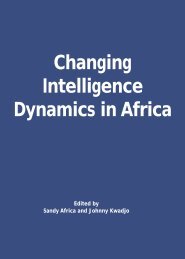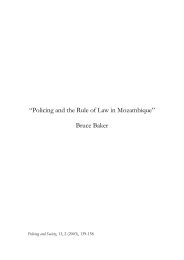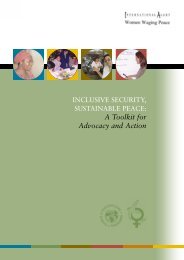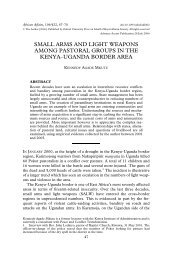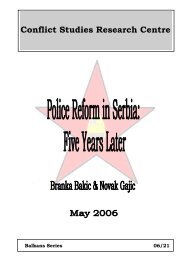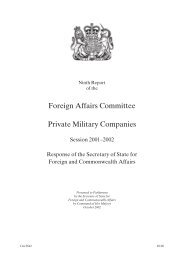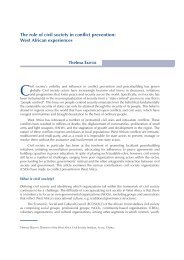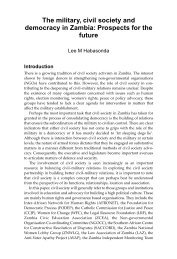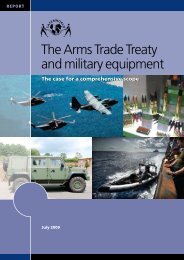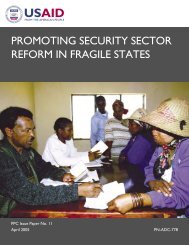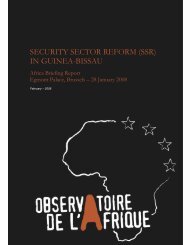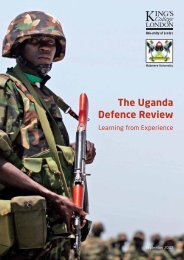AFGHANISTAN'S ELECTION CHALLENGES
AFGHANISTAN'S ELECTION CHALLENGES
AFGHANISTAN'S ELECTION CHALLENGES
Create successful ePaper yourself
Turn your PDF publications into a flip-book with our unique Google optimized e-Paper software.
Afghanistan’s Election Challenges<br />
Crisis Group Asia Report N°171, 24 June 2009 Page 6<br />
The largely non-Pashtun Northern Alliance was reconstituted<br />
in March 2007 as the National United Front,<br />
later simply the National Front. The Jamiat-i Islami<br />
formed the backbone of the “opposition alliance”, with<br />
its leader Burhanuddin Rabbani as chairman, although<br />
some members, including the party’s northern regional<br />
chairman and Balkh governor Atta Mohammad Noor,<br />
did not join. The party founded by Atta’s rival Abdul<br />
Rashid Dostum, the Uzbek-dominated Junbish-i Milliof<br />
a team rather than retain the freedom of individual<br />
negotiation for each vote, even political parties with<br />
members in the Wolesi Jirga have failed to exercise<br />
discipline over them.<br />
Influential international actors have followed a similar<br />
strategy, reluctant to take action against warlord “allies”<br />
for present, let alone past, abuses, and uninterested in<br />
helping build the capacity of nascent political parties<br />
and representative institutions. 38 A leader of a new,<br />
small moderate political party complained: “The international<br />
community has extended support to fundamentalist<br />
forces and has not paid attention to democratic<br />
forces, [or] the people. They [the international community]<br />
think warlords are the answer”. 39<br />
A noticeable political trend following Hamid Karzai’s<br />
presidential election has been the Pashtunisation of the<br />
centre with major, mainly Tajik, Northern Alliance 40<br />
figures eased out of cabinet: Mohammad Qasim Fahim<br />
removed as defence minister; foreign minister Abdullah<br />
Abdullah quitting when effectively demoted; and<br />
Qanooni re-emerging as leader of the Wolesi Jirga. 41<br />
While rightly complaining of exclusion from the centre<br />
in the early post-Taliban years, 42 Pashtuns now head a<br />
number of power ministries including defence, interior<br />
and finance. Former members of the Pashtun-dominated<br />
Hizb-e Islami, largely drawn from educated backgrounds,<br />
also occupy important government positions<br />
even as questions linger over allegiances to Hekmatyar.<br />
yi Islami Afghanistan, 43 was part of the initial line-up,<br />
though a largely silent partner.<br />
The two major Hazara players, Mohammad Mohaqqeq,<br />
the head of Hizb-e Wahdat-e Islami-yi Mardumi Afghanistan,<br />
and Vice President Karim Khalili, stayed<br />
out. Some Shia-Hazara representation was provided<br />
by Mohammad Akbari’s Hizb-e Wahdat-e Islami Milli<br />
as well as Sayed Mustafa Kazimi’s Hizb-e Iqtedar-i<br />
Milli. Kazimi, the coalition’s spokesman, was killed<br />
in the November 2007 Baghlan bombing. Stranger<br />
bedfellows – providing some Pashtun representation –<br />
included a grandson of the late king, Mustafa Zahir,<br />
and former People’s Democratic Party of Afghanistan<br />
(PDPA) officials Nurul Haq Oloomi and Sayed<br />
Mohammad Gulabzoi. While announcing a platform<br />
of desirable constitutional changes, including a more<br />
parliamentary and devolved form of government, the<br />
National Front’s various factions failed to work together<br />
at a local level or in the National Assembly. The real<br />
objective was to select a single candidate for the<br />
presidential race to challenge President Karzai –<br />
something they ultimately failed to do.<br />
38 Similar international support for favoured individuals over<br />
institutions and democratisaton is evident in Pakistan. See<br />
Crisis Group Asia Reports N°137, Elections, Democracy<br />
and Stability in Pakistan, 31 July 2007; N°77 Devolution in<br />
Pakistan: Reform or Revolution? 22 March 2004; and N°40<br />
Pakistan: Transition to Democracy?, 3 October 2002.<br />
39 Crisis Group interview, Kabul, 27 January 2009.<br />
40 More correctly called the United Islamic Front for the<br />
Salvation of Afghanistan, it consisted mainly of non-Pashtun<br />
elements, including the largely Tajik Jamiat-i Islami, the<br />
Uzbek Junbish-i Milli-yi Islami and the Hazara dominated<br />
Hizb-e Wahdat.<br />
41 See Crisis Group Report, Afghanistan’s New Legislature:<br />
Making Democracy Work, op. cit., p. 9.<br />
42 See Crisis Group Report, Afghanistan: The Problem of<br />
Pashtun Alienation, op. cit.<br />
43 Junbish has been going through some internal changes with<br />
Sayed Noorullah Sadat named rayes (head of party) and Dostum<br />
the rahbar (leader of the party) at the party congress in<br />
mid-2008. Dostum, who has largely been in Turkey since late<br />
2008, at one stage announced that Noorullah was fired,<br />
although this dispute was later smoothed over.



